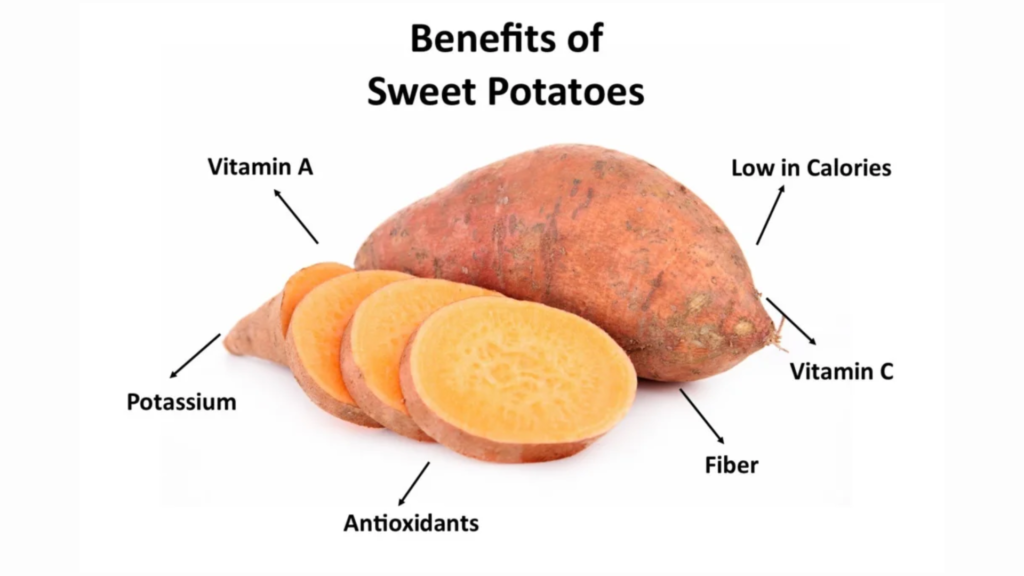
Sweet potatoes are root vegetables known for their fleshy texture and moderately sweet, earthy taste. While most have orange flesh, their color can range from orange to cream, yellow, or even purple. The skin of this vibrant vegetable also varies in color. Orange-fleshed varieties are the sweetest, whereas other colors offer a milder taste and a slightly crumbly texture.
In the U.S., sweet potatoes are particularly popular, with North Carolina leading in their production. Are they unhealthy, or do they fit into a healthy diet plan? Are sweet potatoes more likely to cause weight gain or aid in weight loss? Read on to learn everything regarding sweet potato nutrition and why you might want to add one serving or two to your meals.
Sweet Potato Nutrition Facts

Sweet potatoes pack a punch when it comes to nutrition, offering a rich supply of potassium, vitamin C, and vitamin A. In just 100 grams of raw sweet potatoes, you will find these sweet potatoes nutrition facts:
- Calories: 86
- Sodium: 55 milligrams
- Water: 77%
- Protein: 1.57 grams
- Carbohydrates: 20.1 grams
- Potassium: 337 milligrams
- Sugar: 4.18 grams
- Vitamin A: 709 micrograms
- Vitamin C: 2.4 milligrams
- Fiber: 3 grams
- Fat: 0.05 grams
Carbohydrates
When boiled without skin, a medium-sized sweet potato has 27g of carbohydrates. Starches are the primary component, making up 53% of the carbohydrates. Meanwhile, simple sugars like maltose, glucose, sucrose, and fructose account for 32% of the carbohydrates.
The glycemic index of sweet potatoes can change depending on how they’re prepared and their variety. Boiling them can result in a glycemic index as low as 41, whereas roasting can push it up to 93. The glycemic index (GI) measures how quickly your blood sugar levels increase after eating.
Due to their comparatively high GI, consuming large quantities of sweet potatoes in one meal might not be ideal for individuals suffering from type 2 diabetes. Interestingly, boiling tends to result in a lower GI compared to roasting, baking, or frying.
Fiber
Cooked sweet potatoes are a good source of fiber, with a medium-sized one offering 3.8 grams. This fiber is a mix of soluble types of pectin, which make up 15–23%, and insoluble types of lignin, cellulose, and hemicellulose, which account for 77–85%.
Soluble fibers like pectin can help you feel fuller, reduce food intake, and prevent blood sugar boosts by slowing the digestion of starches and sugars. On the other hand, consuming plenty of insoluble fibers is linked to various health benefits, like better gut health and a lower risk of diabetes.
Vitamins and Minerals

Sweet potato nutrition includes potassium, beta-carotene, and vitamin C. The most plentiful vitamins and minerals found in this vibrant vegetable are:
- Pro-vitamin A: Sweet potatoes are packed with beta-carotene, which your body transforms into vitamin A. Only 100g of this vegetable delivers the daily recommended intake of the essential vitamin A.
- Vitamin B6: This vitamin is crucial for turning food into energy.
- Vitamin B5: Also called pantothenic acid, Vitamin B5 is present in almost every type of food.
- Vitamin C: This antioxidant might help shorten the length of a common cold and enhance skin health.
- Vitamin E: This potent fat-soluble antioxidant can help shield your body from oxidative damage.
- Manganese: This trace mineral plays a vital role in growth, development, and metabolism.
- Potassium: Essential for managing blood pressure, potassium might lower your risk of heart disease.
Starch
Starches are typically divided into three categories according to their digestibility. In sweet potato nutrition, the starch content is distributed as follows:
- Rapidly digested starch makes up 80% of the total starch content in sweet potato. It is rapidly broken down and absorbed, raising the glycaemic index value.
- Slowly digested starch accounts for 9% of the total starch content. This starch breaks down at a slower pace, leading to a smaller increase in blood sugar levels.
- Resistant starch, which comprises 11%, isn’t digested and functions like fiber, nourishing beneficial gut bacteria. Cooling sweet potatoes after cooking might slightly boost the amount of resistant starch.
Protein
A medium-sized sweet potato contains 2 grams of protein, which makes it a modest source of this nutrient. Sweet potatoes are rich in sporamins, unique proteins that make up over 80 percent of their entire protein content.
These sporamins help the plant heal when it suffers physical damage, and recent studies indicate they might have antioxidant properties. Although sweet potatoes are comparatively low in protein, they serve as a vital protein source in several developing countries.
Other Plant Compounds
Similar to other whole-plant foods, sweet potatoes have numerous plant compounds that can influence your health. These compounds include:
- Anthocyanins: Purple sweet potatoes are abundant in anthocyanins, which are known for their powerful antioxidant effects.
- Beta carotene: This antioxidant carotenoid is transformed by your body into vitamin A. Including fat in your meal can enhance the absorption of beta-carotene.
- Chlorogenic acid: This compound is the most dominant polyphenol antioxidant found in sweet potatoes.
Interestingly, the antioxidant power of sweet potatoes grows with the intensity of their flesh color. Varieties with deep hues, like red, purple, and deep orange, have the highest scores. Cooking sweet potatoes boosts the absorption of vitamin C and certain antioxidants, although it may slightly reduce the levels of other plant compounds.
Sweet Potato Nutrition: Benefits of It

Sweet potatoes stand out as the most nutrient-rich and versatile root vegetable. Below are the nutrition benefits of sweet potato:
Maintains Vision Health
Vitamin A plays a crucial role in keeping your vision healthy. A lack of vitamin A can lead to issues such as keratin buildup on the conjunctiva, night blindness, dry eyes, and even complete vision loss in serious cases. Just one medium-sized sweet potato can fulfill and surpass your daily vitamin A requirements.
In addition, sweet potatoes have crucial antioxidants that support eye health. For instance, vitamin C, vitamin E, and beta-carotene have been found to slow down the development of age-related macular degeneration, a health condition that can lead to vision loss. To further support your eye health, consider adding other eye vitamins, such as omega-3 fatty acids and zinc, to your diet.
May Help to Prevent Cancer
Sweet potatoes are packed with antioxidants that have been researched for their role in cancer prevention and treatment. Purple sweet potatoes are especially rich in anthocyanins, which seem to encourage apoptosis in cancer cells.
Studies have revealed that sweet potatoes are rich in particular antioxidant phytochemicals, like phenolic compounds, carotenoids, and ascorbate. These, along with resistant starch and antioxidant dietary fibre, can slow the growth of certain types of cancer cells.
Supports Immune System
Sweet potatoes are abundant in two powerful antioxidant vitamins: vitamin A and vitamin C. Though all sweet potatoes offer vitamin A, the orange types are particularly rich in it. Both vitamin C and vitamin A play a crucial role in regulating your immune system and improving your body’s defense against infections.
The Bottom Line on Sweet Potato Nutrition
Sweet potatoes are rich in nutrition, offering a host of health benefits. Rich in important vitamins and minerals like vitamin C, vitamin A, fiber, and potassium, these versatile vegetables support several bodily functions.
In addition, the antioxidants in sweet potatoes, such as anthocyanins and beta carotene, help shield the body from age-related and chronic diseases. With their moderate GI, sweet potatoes are a smart vegetable choice for those handling diabetes or aiming to keep their blood sugar levels steady.
By incorporating sweet potatoes into your regular diet, you can boost your overall health while savoring their delicious and satisfying flavors. I hope that this article has helped you to know everything about sweet potato nutrition.
